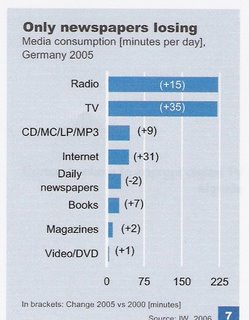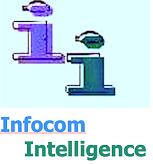
An interesting report by Deutsche Bank Research (1) argues that the Media sector is facing its biggest challenge since Gutenberg created the printing press.
The explosive growth of worldwide blogs and citizen journalism, combined by the proliferation of new devices and technologies (news on cellphones, IPTV, TV on Web, podcasts, personalisation of content) is providing a new level of interactivity among media consumers, who can be now also media producers.
The web 2.0 is a large reason of this new phenomena. What does it really mean?
"Even though there are masses of recipients, the Web 2.0 is not a mass medium in the traditional sense. The Web 2.0 lacks the uniform underlying structure needed for this. As a result of this diffuse structure all attempts to define the Web 2.0 become entangled in IT abbreviations (e.g. Atom, AJAX, API, RSS, SVG, XML, XUL) and visionary consultant-speak (e.g. prosumer, mini-preneur, generation tekki 2.0, collective intelligence, user generated content, citizen journalism, wisdom of the masses and ecocast). For unlike the Web 1.0, the Web 2.0 does not represent a basic technical innovation. With offers such as Blogger.com, Del.icio.us,
facebook, Flickr, GarageBand, Habbo-Hotel, MySpace, Linkedin, Spoke, Open BC, Studylounge, YouTube, Wer-weiss-was and Wikipedia, the Web 2.0 merely documents the realisation that the internet was never just a digital market place but always a social forum for exchanging opinions and knowledge. "
DB Research analyzed the media consumption in Germany from 2005 versus 2000 (see figure at the top). It appears that all the average German media consumers has increased its media consumption for all types of media, except newspapers. A comparaison with North America can be done since Germany is in the G7 and a large country. However, it appears in North America that the consumption of TV has not increased like in Germany, particularly among consumers below 35 years old who surf a lot on Internet for leisure and information.
With media consumers becoming more media producers, they may consume more media for information and entertainment. New technologies tools and software enable them to make easier podcasts and video, even over their cellphone or digital camera.
Louis Rhéaume
Infocom Intelligence
infocom@videotron.ca
514-528-6422
(1) Media industry facing biggest upheaval since Gutenberg; October 12, 2006, Deutsche Bank Research

1 comment:
iptv solutions,Smart google adsense
Post a Comment